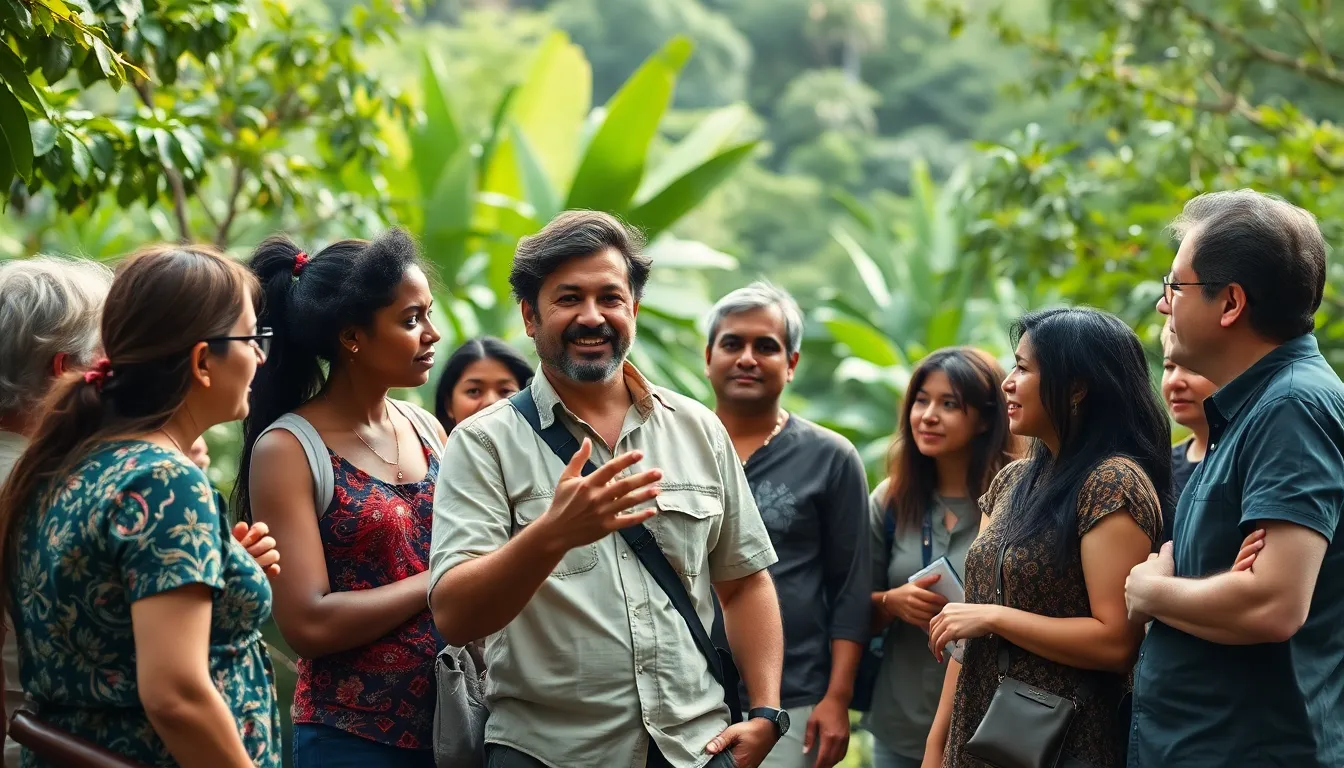Anthropological insights offer a fascinating lens through which to explore human behavior, culture, and society. By examining the intricate tapestry of human life, anthropology reveals the underlying patterns that shape our daily interactions and collective identities. This field dives deep into the rituals, beliefs, and social structures that define different communities, providing a richer understanding of what it means to be human.
In a rapidly changing world, these insights become increasingly valuable. They help decode the complexities of globalization, migration, and cultural exchange. By applying anthropological perspectives, individuals and organizations can navigate social dynamics more effectively, fostering empathy and collaboration across diverse groups. Understanding these insights not only enriches personal knowledge but also enhances the ability to engage meaningfully with the world around us.
Table of Contents
ToggleOverview of Anthropological Insights
Anthropological insights provide a comprehensive understanding of human behavior, culture, and societal structures. Anthropology focuses on rituals, beliefs, and social frameworks that influence communities, revealing how these elements shape individual identity. These insights help decode complex cultural dynamics and offer valuable perspectives in the context of globalization.
Key Areas of Study
- Cultural Anthropology
Cultural anthropology examines daily life practices, rituals, and traditions. It investigates how culture shapes perceptions, behaviors, and group identities.
- Social Anthropology
Social anthropology studies social relationships and institutions. It explores kinship, community dynamics, and power structures, offering insights into social organization.
- Linguistic Anthropology
Linguistic anthropology focuses on language as a cultural tool. It analyzes how language influences thought, communication, and social interaction.
- Archaeological Anthropology
Archaeological anthropology investigates past societies through material remains. It provides context for understanding historical cultural developments and human evolution.
- Biological Anthropology
Biological anthropology examines the biological aspects of humans. It studies human evolution, genetic diversity, and adaptations to various environments.
Relevance in Today’s World
Anthropological insights play a crucial role in addressing contemporary issues. They foster empathy by shedding light on different cultural perspectives, enhancing intercultural communication. In a globalized society, these insights support collaboration among diverse populations, helping to resolve conflicts and misunderstandings.
Application of Insights
Individuals and organizations apply anthropological insights in various fields, including education, healthcare, and business. Understanding cultural nuances improves strategies for engagement and encourages inclusive practices. Such applications lead to more effective communication and better connections within multicultural settings.
Historical Context of Anthropology

Anthropology’s historical context reveals the discipline’s development and its foundational figures. Key advancements in thought have shaped how societies understand human behavior and culture.
Key Figures in Anthropology
- Franz Boas: Often considered the “father of American anthropology,” Boas emphasized cultural relativism and fieldwork. He advocated for the study of cultures within their own contexts rather than through a Eurocentric lens.
- Margaret Mead: Mead’s work on cultural aspects of human behavior, especially in adolescence, illuminated the role of culture in shaping identity. Her research in Samoa challenged Western notions of gender and sexuality.
- Bronisław Malinowski: Malinowski pioneered participant observation as a research method. His studies on the Trobriand Islanders demonstrated the importance of understanding cultural practices from an insider’s perspective.
- Claude Lévi-Strauss: Lévi-Strauss introduced structuralism to anthropology, focusing on underlying structures in human thought. His analyses of myths and kinship systems offered new ways to interpret cultural phenomena.
- Hortense Powdermaker: Powdermaker’s insights into race and culture advanced the understanding of interpersonal dynamics in multicultural societies. Her fieldwork highlighted the significance of social relationships.
Evolution of Anthropological Thought
- Early Anthropology: Anthropology originated in the 19th century within colonial contexts, often centered on the study of “exotic” societies. Anthropologists sought to document and categorize cultural practices from a largely Eurocentric viewpoint.
- Cultural Relativism: In the early 20th century, the perspective shifted towards cultural relativism, emphasizing the unique context of each culture. This movement encouraged the idea that no culture is superior, promoting a more equitable understanding of human societies.
- Postmodern Critique: The late 20th century brought postmodern critiques, questioning grand narratives and highlighting voices previously marginalized. This approach advocated for more inclusive methodologies and recognized the influence of politics on anthropological research.
- Contemporary Themes: Modern anthropology addresses globalization, migration, and cultural hybridity, drawing connections between local and global issues. Researchers examine how cultural identities evolve in response to social changes and technological advancements.
Methodologies in Anthropology
Anthropology employs diverse methodologies to gather insights about human behavior, culture, and society. These approaches involve both qualitative and quantitative methods, which contribute significantly to understanding complex social phenomena.
Qualitative vs. Quantitative Methods
Qualitative methods focus on exploring human experiences and cultural contexts through interviews, participant observations, and ethnography. They prioritize detailed narratives and in-depth analysis, providing rich insights into social interactions and cultural meanings.
Quantitative methods, on the other hand, emphasize numerical data and statistical analysis. Surveys and experiments are commonly used here to generate measurable information about populations and social trends. Both methods are vital, as qualitative approaches can inform the design of quantitative studies, while quantitative findings can enhance qualitative inquiries by establishing patterns or correlations.
Fieldwork and Participant Observation
Fieldwork remains a cornerstone of anthropological research. This immersive approach allows anthropologists to engage directly with communities, gaining firsthand experience of daily life and cultural practices. Participant observation, a key component of fieldwork, involves researchers actively participating in the community’s activities. This technique fosters trust and builds rapport, enabling deeper understanding of social norms and values.
Through fieldwork and participant observation, anthropologists collect qualitative data, revealing the intricacies of human behavior within various cultural contexts. The findings from these methodologies enrich the discourse on human identity and social structures, making them indispensable tools in anthropology.
Contemporary Applications of Anthropological Insights
Anthropological insights play a vital role in various contemporary scenarios, enhancing understanding and engagement within diverse communities.
Cultural Anthropology in Modern Society
Cultural anthropology examines daily life practices and group identities, providing insights applicable to modern society. Businesses leverage cultural anthropology to create targeted marketing strategies that resonate with specific demographic groups. In education, cultural anthropologists inform curricula that reflect student backgrounds, fostering inclusivity. Healthcare professionals utilize cultural insights to improve patient care by recognizing cultural beliefs and practices that affect health decisions. These applications illustrate how cultural anthropology enhances communication, cultivates respect for diversity, and drives social change.
The Role of Anthropology in Global Issues
Anthropology addresses pressing global issues through its emphasis on cultural understanding. Climate change, migration, and social inequality are areas where anthropological insights contribute significantly. Anthropologists analyze how different communities perceive and respond to environmental changes, offering solutions that honor local knowledge systems. In migration studies, anthropologists investigate social integration, helping policymakers craft inclusive strategies that respect cultural identities. By engaging with these global challenges, anthropology fosters collaboration and empathy, promoting sustainable practices in an interconnected world.
Challenges Facing Anthropology Today
Anthropology faces several challenges in maintaining its relevance and integrity in a rapidly changing world. Ethical dilemmas and technological advancements significantly influence the direction of anthropological research and practice.
Ethical Considerations
Anthropologists grapple with ethical dilemmas surrounding representation and consent. Engaging with communities necessitates transparency regarding research objectives and potential impacts. Cultural sensitivity remains paramount, as anthropologists must avoid perpetuating stereotypes or exploitation. Recent debates around the use of participant data highlight the need for informed consent and respect for community norms. Adhering to ethical guidelines, such as those established by the American Anthropological Association, ensures anthropologists conduct research responsibly while honoring the rights and voices of the communities involved.
The Impact of Technology
Technology reshapes anthropological methods and access to information. Digital tools facilitate data collection, analysis, and dissemination, allowing anthropologists to reach broader audiences. However, reliance on technology can lead to challenges in authenticity and depth of understanding. Virtual fieldwork poses concerns about the richness of participant interactions compared to traditional methods. Moreover, the digital divide raises questions about inclusivity, as not all communities have equal access to technological resources. Balancing technological integration with traditional methodologies is crucial for robust and nuanced anthropological insights.
Anthropological insights serve as a powerful lens through which to understand the complexities of human behavior and cultural dynamics. By embracing these perspectives, individuals and organizations can foster deeper connections and navigate the challenges of an increasingly interconnected world.
The application of anthropology in various fields highlights its relevance in addressing contemporary issues while promoting inclusivity and respect for diversity. As the discipline continues to evolve, it remains essential for enhancing empathy and collaboration among diverse communities.
Ultimately, engaging with anthropological insights enriches not only personal understanding but also collective efforts to create a more inclusive and sustainable future.









